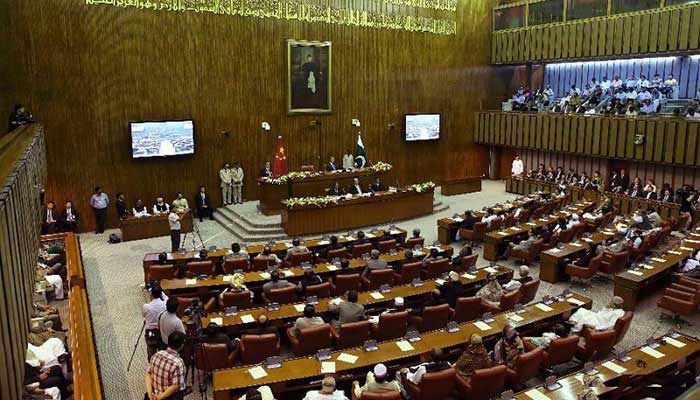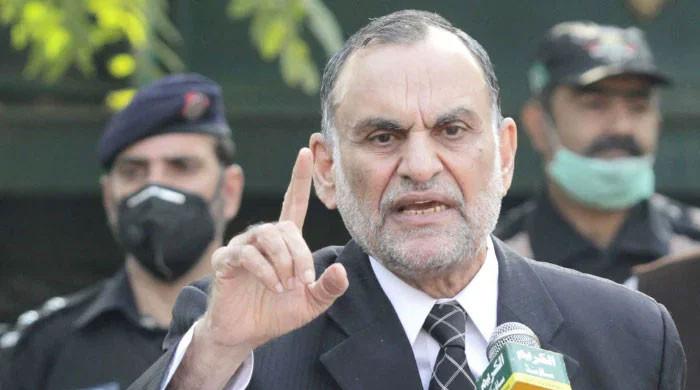Senate rejects two FATF-related bills after PPP, PML-N vote against them
PML-N and PPP vote against Anti-Money Laundering (Second Amendment) Bill, 2020 and Islamabad Capital Territory Waqf Properties Bill
August 26, 2020

ISLAMABAD: The Senate on Tuesday rejected the Anti-Money Laundering (Second Amendment) Bill, 2020 and the Islamabad Capital Territory Waqf Properties Bill adopted by the National Assembly after the PML-N and PPP voted against them.
During yesterday’s session, the two parties insisted that the Leader of the House should withdraw his remarks against their leadership and the laid-down procedure concerning the bills be followed.
Dr Shahzad Waseem, who represents the prime minister in the House, maintained that he had not named anyone and had made a general statement that Pakistan had not been put on the grey list during the PTI government.
However, the PPP lawmakers insisted that Dr Waseem clarify that no political leadership but the Foreign Office had issued a notification against other persons and outfits, including Hafiz Saeed, Lakhvi, and Lashkar-e-Taiba.
The two FATF Bills moved by Adviser to the PM on Parliamentary Affairs Dr Babar Awan were rejected through the voice vote.
The adviser was of the opinion that the chair could use its discretionary power for consideration and passage of the bills, keeping in view the national security and interests, as members of all parties had already debated and considered the bills.
The House witnessed heated debate from both the benches for and against Chairman Muhammad Sadiq Sanjrani about using his discretion of taking up the Bills for consideration without taking into account the two-day notice, as the National Assembly had passed them on Monday.
Law Minister Dr Farogh Naseem, Advisor on Parliamentary Affairs Senator Mian Raza Rabbani, Sherry Rehman, Leader of Opposition Raja Muhammad Zafarul Haq, Mustafa Nawaz Khokhar, Maula Bukhsh Chandio, Mushahidullah Khan and Javed Abbasi spoke on whether or not the chair could exercise its discretionary power after having allowed the inclusion of the bills on the orders of the day, ignoring the notice period.
PPP, PML-N lawmakers demand apology from leader of the House
Much of the debate in the House revolved around PPP senators Sherry Rehman, Chandio and Mustafa Nawaz Khokhar demanding that the leader of the house apologize for his remarks regarding Asif Ali Zardari and Shehbaz Sharif.
Sherry said it was a controversial matter as, on the one hand, Dr Waseem kept insulting and criticising the PPP and PML-N leadership, on the other, he was seeking cooperation from the Opposition.
“Whatever cooperation we extended was for the sake of Pakistan but one government member would appreciate us for cooperation and the next would start berating our leadership. This motion will be defeated and now you will see how a bulldozer works,” she asserted.
Khokhar and Chandio added that mudslinging of the party leadership was totally unacceptable.
“The other day, the Leader of the House said the Opposition parties leadership faces money laundering charges, while today, advisor on parliamentary affairs said the Opposition should support the bills, as these related to Pakistan national security. Whom should we believe is correct? Dr Shahzad should withdraw his remarks against our political leadership, otherwise, I urge my seniors not to back these bills,” Khokhar added.
Some Opposition senators alleged that Dr Shahzad was trying to spoil the House's environment and undermine the legislature by not showing tolerance, courtesy and respect for the Opposition benches.
Dr Shahzad, however, maintained that he had not named any political leader but had tried to state facts about money laundering.
Earlier, the Senate had a bumpy start, as the Opposition senators staged a protest against not including the question hour in the orders of the day. Senator Rabbani had accused the government of running away from parliamentary accountability, as the leader of the house was asked to move a motion for the suspension of the question hour.
He added that the foreign policy was not being framed at the Foreign Office. “The situation today, which was evolving, was that the national security sphere had been widened and this included economy, energy, environment and all other spheres of life.”
Rabbani added that due to the current situation there was now a hybrid democratic model with the veto power lying with the ruling elite and the citizens feeling alienated with their rights privatized.
Originally published in The News











